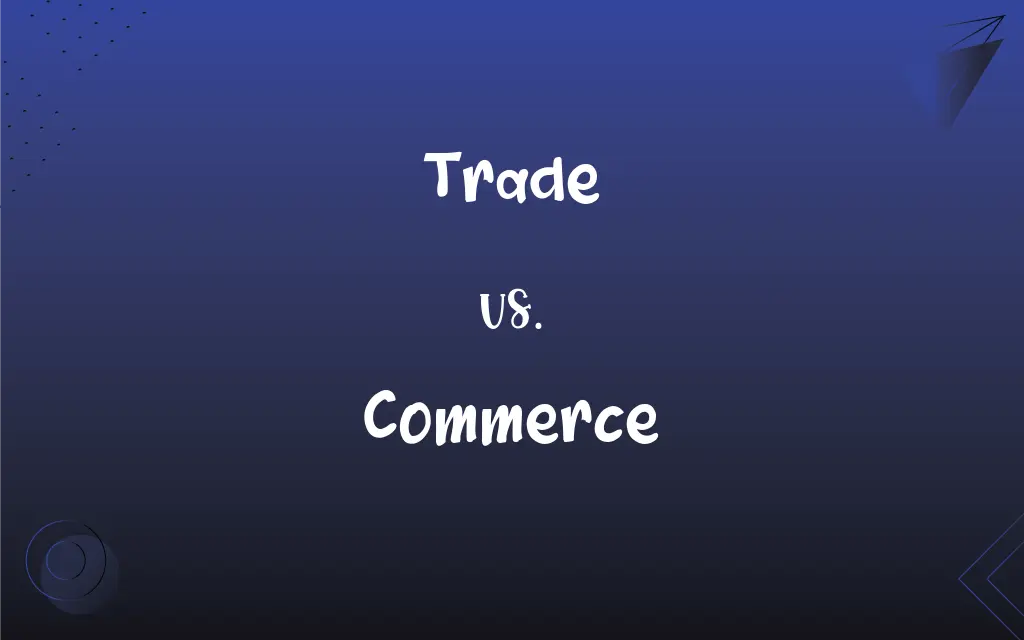Trade vs. Commerce: What's the Difference?
Edited by Janet White || By Harlon Moss || Updated on October 6, 2023
Trade involves the buying and selling of goods and services, while commerce encompasses trade and includes all activities that facilitate trade, such as transportation and banking.

Key Differences
Trade, often conceived in a narrower lens, primarily encapsulates the activity of buying and selling of goods and services. Commerce, on the other hand, comprehensively involves not only trade but also the various stages and activities, like transporting and advertising, that revitalize and streamline trading activities.
Dive deeper, and one recognizes that trade is typically divided into two key categories: international (between countries) and domestic (within a country). Commerce, with its broader strokes, envelops these aspects of trade but extends its realm into the supportive activities that facilitate and enhance the trading process.
Notably, trade is fundamentally the exchange of goods and services, often focused on the completion of the transaction and the reciprocal transfer of value. Commerce goes beyond to comprise the legal, economic, political, social, cultural, and technological systems that augment and expedite these exchanges across a plethora of industries.
In terms of economic development, trade acts as a crucial component, driving exchanges and creating economic networks between entities. Meanwhile, commerce pervasively influences the macroeconomic environment by setting up systems and platforms that assure the smooth functioning of trade mechanisms.
Trade can be perceived as the frontline activity in the marketplace where the actual exchange occurs, while commerce is the comprehensive field that ensures this marketplace exists, operates efficiently, and evolves in response to changing economic landscapes, thereby embedding a framework that propels trade.
ADVERTISEMENT
Comparison Chart
Definition
Involves exchanging goods and services
Encompasses trade plus activities that facilitate such exchanges
Scope
Narrower (focused on exchange)
Broader (includes supportive activities)
Types
Mainly international and domestic
N/A
Main Activities
Buying and selling
Trading, transporting, banking, advertising, etc.
Economic Role
Facilitates direct exchange and linkages
Ensures smooth operation of all trading activities
ADVERTISEMENT
Trade and Commerce Definitions
Trade
Trade can denote a particular occupation or craft.
Her trade is in the technology sector.
Commerce
Commerce denotes activities that facilitate trading.
E-commerce platforms have revolutionized the world of commerce.
Trade
Trade may indicate the clientele of a business or profession.
The restaurant has a lively lunchtime trade.
Commerce
Commerce encapsulates the transportation and storage of goods.
Efficient railways and ports are crucial for smooth commerce.
Trade
Trade can refer to a place where purchases are made.
The local trade is popular among residents.
Commerce
Commerce can refer to social relations, especially the exchange of views, attitudes, etc.
Their political commerce was often intense.
Trade
Trade refers to the basic act of buying and selling.
The trade between the two countries has increased over the years.
Commerce
Commerce also involves the advertising and sale of goods.
Digital marketing has become a significant part of commerce.
Trade
Trade implies a habitual practice of exchanging items.
The children would often trade cards among themselves.
Commerce
Commerce pertains to the exchange of goods on a large scale.
Global commerce has been impacted by the pandemic.
Trade
The business of buying and selling commodities, products, or services; commerce.
Commerce
The buying and selling of goods, especially on a large scale, as between cities or nations.
Trade
A branch or kind of business
The women's clothing trade.
Commerce
Intellectual exchange or social interaction.
Trade
The people working in or associated with a business or industry
Writers, editors, and other members of the publishing trade.
Commerce
Sexual intercourse.
FAQs
What encompasses commerce?
Commerce includes trade plus all activities that facilitate trade, such as transportation, insurance, and banking.
How does commerce support trade?
Commerce supports trade by providing and managing the infrastructure and services that facilitate the exchange of goods and services.
Can commerce exist without trade?
No, trade is a core component of commerce, making actual exchanges, while commerce involves support activities.
What is international trade?
International trade involves exchanging goods and services across international borders.
Can a single transaction be considered trade?
Yes, even a single transaction where goods or services are exchanged qualifies as trade.
Can trade occur without commerce activities?
While trade is a transaction, some level of commerce, even minimal, is typically involved to facilitate it.
Why is trade crucial for an economy?
Trade allows economies to utilize resources efficiently, increases market access, and fosters economic growth.
What is domestic trade?
Domestic trade involves the exchange of goods and services within the borders of a country.
How is commerce linked to economic systems?
Commerce interacts with economic systems by influencing and being influenced by regulations, market conditions, and economic policies.
How has e-commerce influenced traditional commerce?
E-commerce has expanded market reach, reduced operational costs, and revolutionized traditional commerce activities.
What role does banking play in commerce?
Banking facilitates commerce by providing financial services like loans, credits, and transaction processing essential for trading activities.
How is trade influenced by market conditions?
Market conditions, like supply and demand, determine prices and volumes, influencing trade practices and outcomes.
How do technological advancements impact commerce?
Technological advancements, like digital payment systems and AI, streamline, and innovate commerce activities, enhancing efficiency and customer experiences.
Is e-commerce a type of commerce?
Yes, e-commerce is commerce conducted electronically, typically over the internet.
Is every trader engaged in commerce?
While traders engage in commerce indirectly, not all are directly involved in its various facilitating activities.
What is trade?
Trade refers to the act of buying and selling goods and services between parties.
What’s an example of commerce in daily life?
Shopping online involves e-commerce, where several activities, like payment processing and shipping, facilitate trade.
Is commerce always international?
No, commerce can be local, national, or international, involving various supportive activities on different scales.
Does trade always involve physical goods?
No, trade can involve both tangible goods (like car) and intangible services (like consulting).
What role do governments play in trade?
Governments regulate trade by enforcing laws, tariffs, and trade agreements and ensuring fair practices.
About Author
Written by
Harlon MossHarlon is a seasoned quality moderator and accomplished content writer for Difference Wiki. An alumnus of the prestigious University of California, he earned his degree in Computer Science. Leveraging his academic background, Harlon brings a meticulous and informed perspective to his work, ensuring content accuracy and excellence.
Edited by
Janet WhiteJanet White has been an esteemed writer and blogger for Difference Wiki. Holding a Master's degree in Science and Medical Journalism from the prestigious Boston University, she has consistently demonstrated her expertise and passion for her field. When she's not immersed in her work, Janet relishes her time exercising, delving into a good book, and cherishing moments with friends and family.































































